MCALLEN, Texas – The key to developing an automotive industry cluster for the Rio South Texas region is to create a digital data system.
This is the view of Adam Gonzalez, CEO of the Council for South Texas Economic Progress. Gonzalez spoke about the project at a recent COSTEP event in McAllen.
“The next step is to create data system,” Gonzalez said. “When we went into economic development, we felt we needed data and validated data, data was going to tell us where, where we need to go.”
Gonzalez said the objective of phase one is the create the auto cluster. But the data collected will also be useful for other clusters that COSTEP plans to develop in the not-too-distant future.
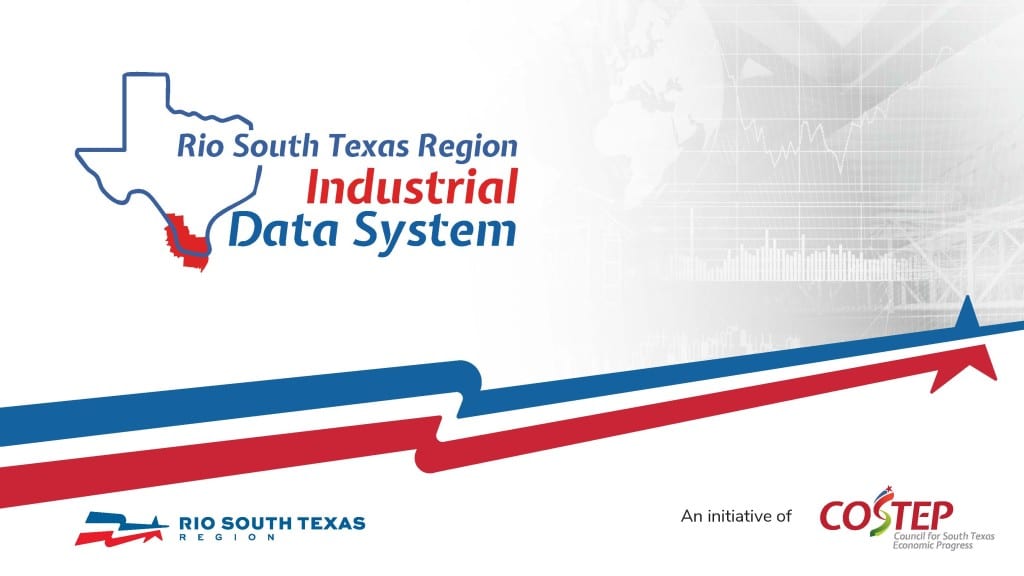 COSTEP Industrial Data System Presentation, July 2025. Page 1.
COSTEP Industrial Data System Presentation, July 2025. Page 1.“We aim to develop an industrial digital data system that consolidates detailed information on manufacturing companies across the region, and the key goals are to identify the key industrial sectors active in the region,” he said.
“So, in gathering this data, we’re not going to stick just to the automotive piece of it. If we’re going to do an inventory and get this digital concept going, we have to gather all of the manufacturing operations that exist in the region so that when we go back into the automotive or the aerospace or the electronics or the medical or the energy cluster, we already have that data gather. We don’t have to go back through it again.”
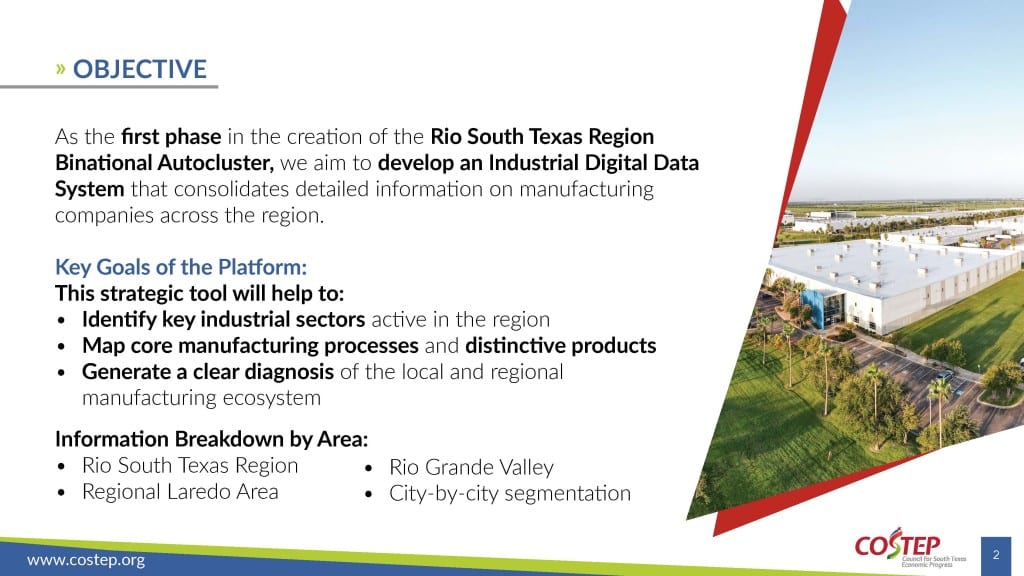 COSTEP Industrial Data System Presentation, July 2025. Page 2.
COSTEP Industrial Data System Presentation, July 2025. Page 2.Gonzalez said the information will be broken down by region – as in the Rio South Texas region – by county, and by city, on both sides to the Rio Grande/Bravo. That is because the cluster will include northern Tamaulipas. “It is a binational initiative,” Gonzalez said.
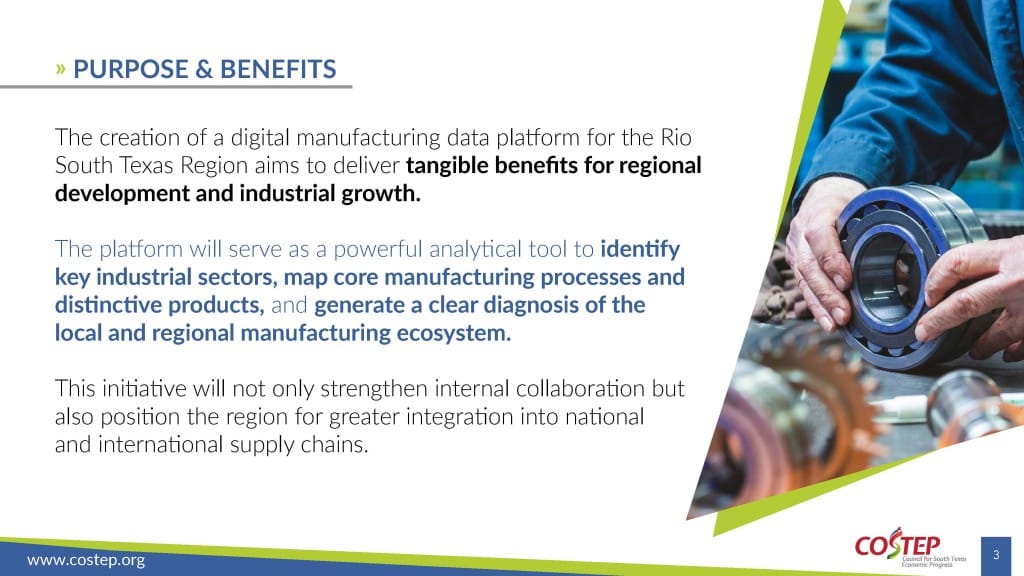 COSTEP Industrial Data System Presentation, July 2025. Page 3.
COSTEP Industrial Data System Presentation, July 2025. Page 3.The purpose, Gonzalez said, is to deliver “tangible benefits for regional development and industrial performance.” The information gathered, he said, will help attract new businesses and expand existing ones. “We will position the region for greater integration in national and international supply chains,” Gonzalez predicted.
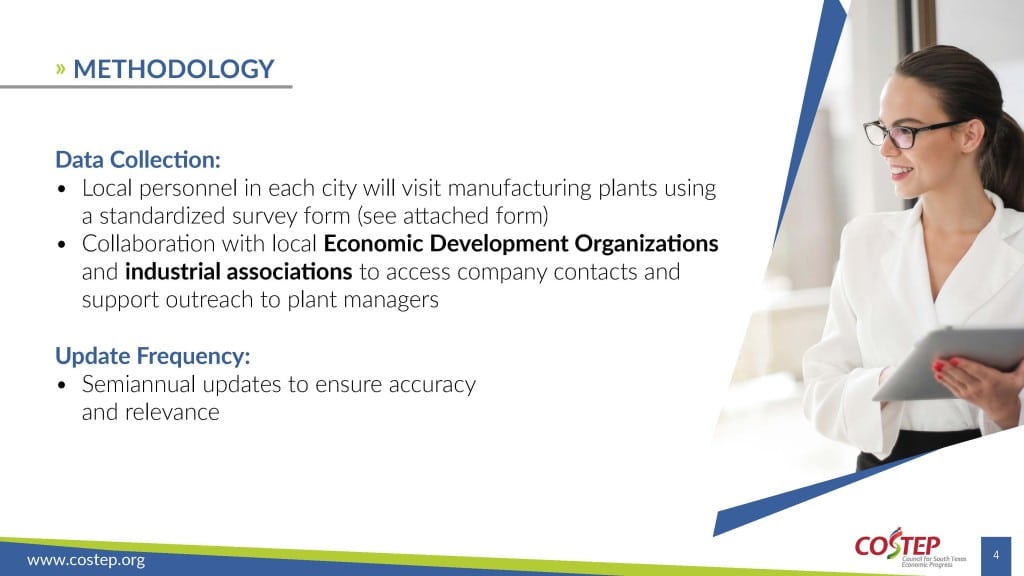 COSTEP Industrial Data System Presentation, July 2025. Page 4.
COSTEP Industrial Data System Presentation, July 2025. Page 4.The key, Gonzalez said, is bringing all stakeholders to the table.
“We don’t have one organism that can go out there and say, I’m going to start knocking on doors. Every one of us here has relationships that can be leveraged in order to gather this data.”
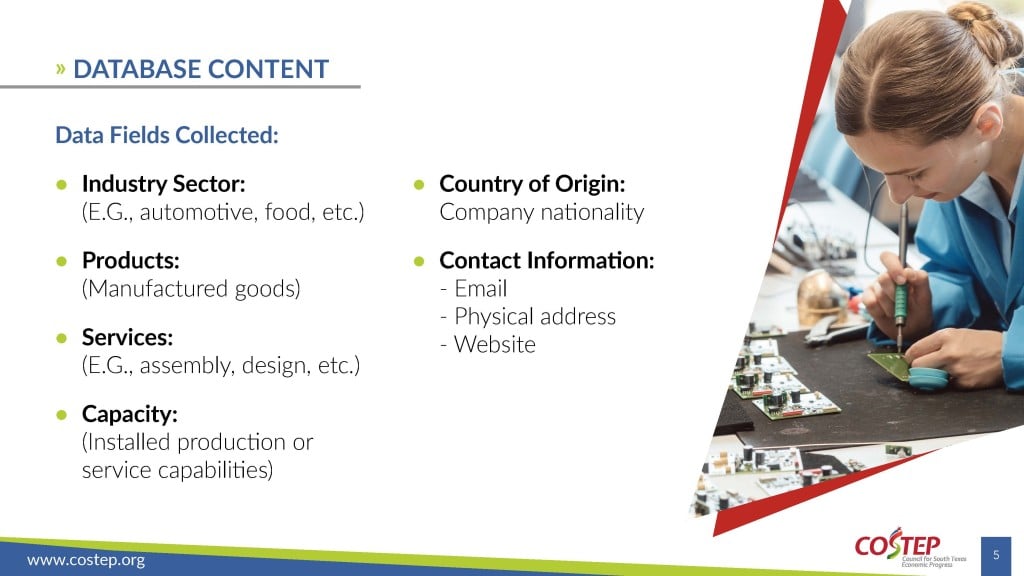 COSTEP Industrial Data System Presentation, July 2025. Page 5.
COSTEP Industrial Data System Presentation, July 2025. Page 5.Once the digital data has been collected, the plan is to keep it updated every six months, Gonzalez said.
“If we update it every six months, I think that would be sufficient so that we can see any changes that have happened in the region.”
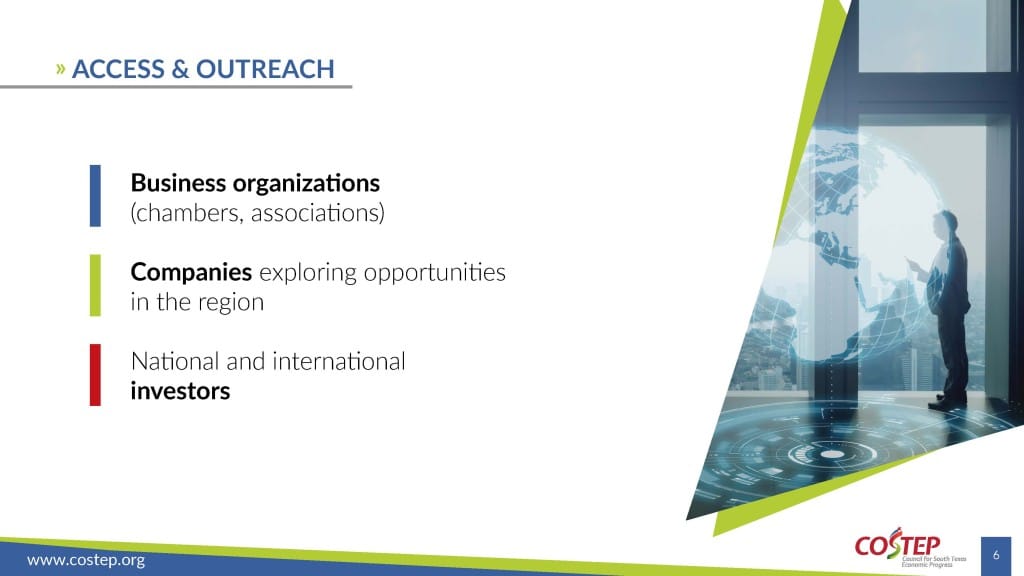 COSTEP Industrial Data System Presentation, July 2025. Page 6.
COSTEP Industrial Data System Presentation, July 2025. Page 6.Gonzalez said data fields are pretty basic. “You know, the industry sector, the products manufactured, the services that are performed, the capacity that each manufacturing operation has, the country of origin, and contact information: email, physical address or website for each one of the organizations.”
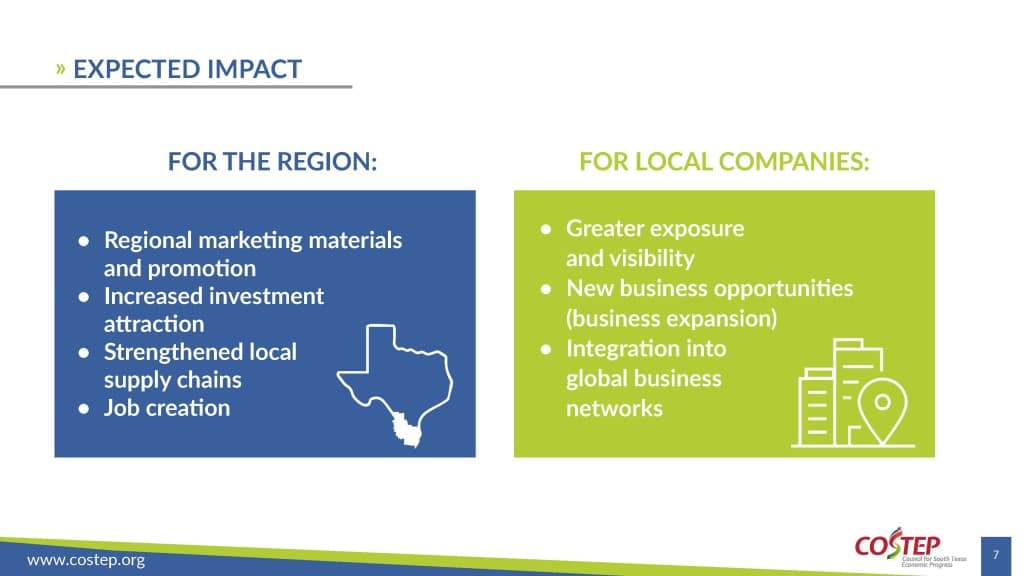 COSTEP Industrial Data System Presentation, July 2025. Page 7.
COSTEP Industrial Data System Presentation, July 2025. Page 7.Gonzalez continued: “We’ll be able to do outreach to other chambers, other associations, nationally and internationally, to promote ourselves, companies exploring opportunities in the region as well, and national and international investors.
“As I mentioned earlier today, when we promote our region, we’re promoting our infrastructure, we’re promoting the youth, our educational system… and the manufacturing here already, (the manufacturing) we’ve been doing it for 60 years.”
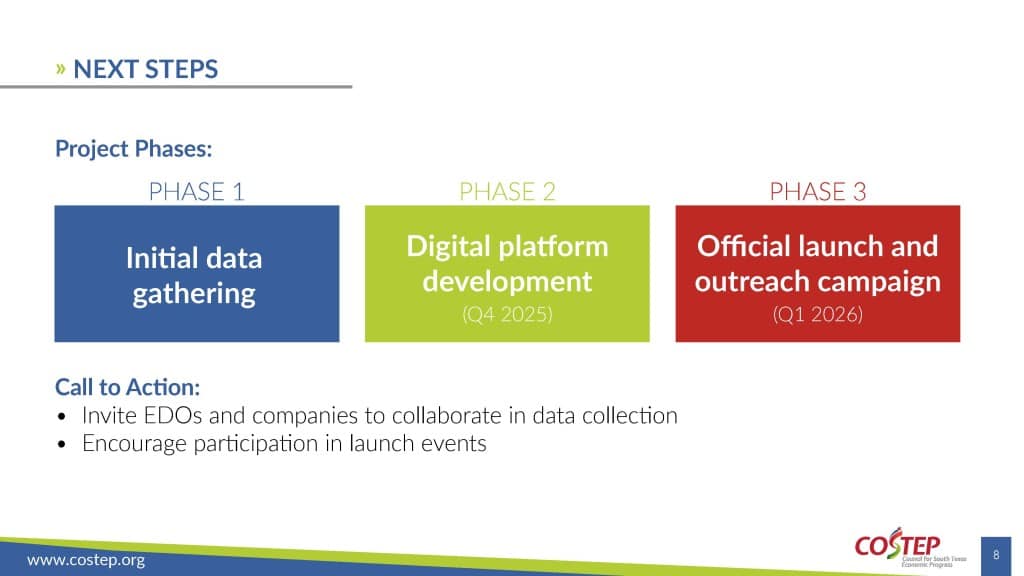 COSTEP Industrial Data System Presentation, July 2025. Page 8.
COSTEP Industrial Data System Presentation, July 2025. Page 8.The expected impact, Gonzalez said, is to have “unified regional marketing materials for the promotion to our cluster, to increase investment attraction, strengthen the local supply chains and job creation, which is our ultimate goal, to keep our talent here and be able to employ them here.”
And for the local companies, Gonzalez said, there will be “greater exposure and visibility, new business opportunities for business expansion, integration into global business networks.”
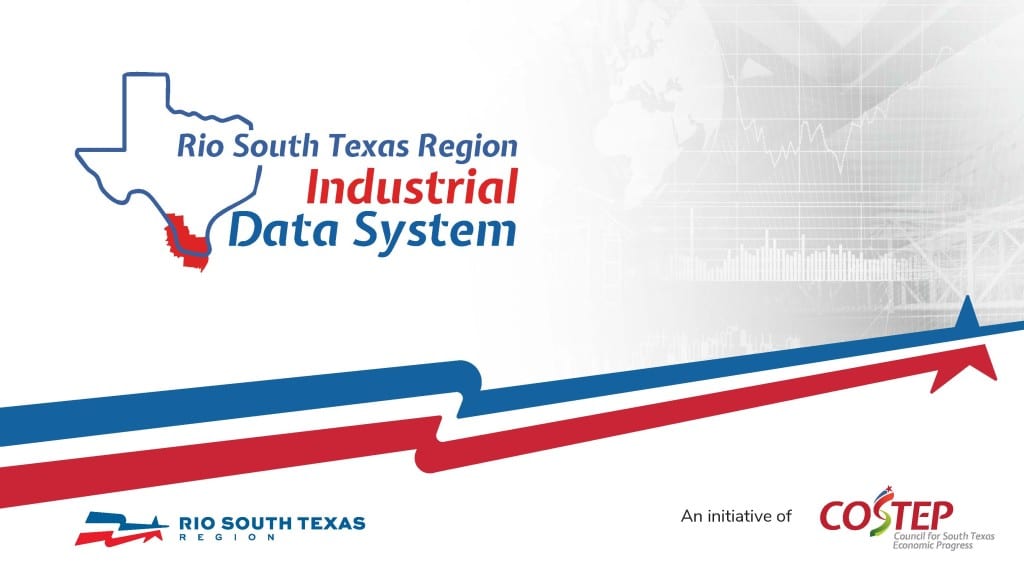 COSTEP Industrial Data System Presentation, July 2025. Page 9.
COSTEP Industrial Data System Presentation, July 2025. Page 9.Gonzalez said that with buy-in from all stakeholders, the project could be complete by the fourth quarter of 2025 or the first quarter of 2026.
“That’s all going to depend on everybody’s time and the effort that we’re able to put into this, because this is going to take us coming together. It’s not going to work with just one organization (COSTEP) coming up with this vision and then trying to push it forward. I think there needs to be a regional effort.”
Editor’s Note: Here is a video recording of Adam Gonzalez’s presentation:
The post Gonzalez: Data collection is key to creating an auto cluster for the Rio South Texas region appeared first on Rio Grande Guardian.
 (2).png)






 English (US)
English (US)